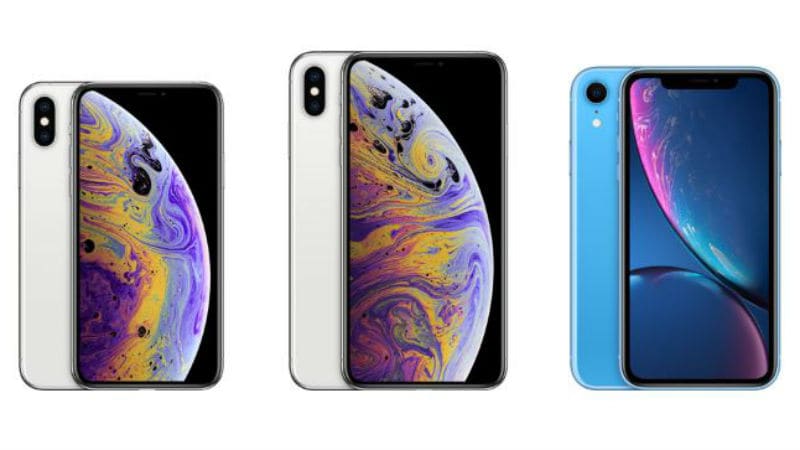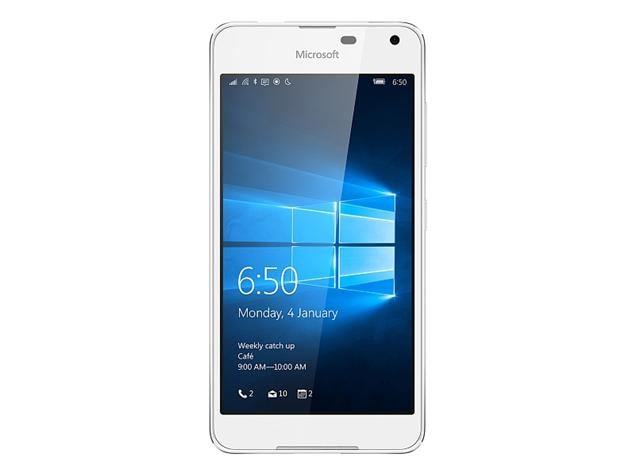iPhone XS vs iPhone XS Max vs iPhone XR: Price in India, Specifications Compared

Apple on Wednesday at its Cupertino launch event unveiled three new iPhone models - iPhone XS, iPhone XS Max, and iPhone XR. Overall, the new iPhone lineup amounts to an upgrade to the iPhone X, with the premium iPhone XS and iPhone XS Max, and a relatively cheaper variant called the iPhone XR that shares a similar design but loses a few features. In terms of pricing, the top-end models have pushed the barrier further while the affordable model costs what premium iPhones used to cost. However, each model comes with some unique set of features. The iPhone XS sports a 5.8-inch display and packs the new A12 Bionic SoC and some upgraded camera features. Similarly, the iPhone XS Max arrives with a massive 6.5-inch display, while the iPhone XR which comes in a variety of colour options and boasts a Liquid Retina LCD screen. Yet, all the three iPhone models in 2018 contain similar core features. You can see how that breaks down, as we have compared the India price, specifications, and features to help you can get an idea of the differences and similarities between iPhone XS, iPhone XS Max, and iPhone XR.
iPhone XS vs iPhone XS Max vs iPhone XR price in India
Apple has launched the iPhone XS and iPhone XS Max in 64GB/ 256GB/ 512GB inbuilt storage variants and the iPhone XR in 64GB/ 128GB/ 256GB models. The price of iPhone XS in India has been set at Rs. 99,900 for the 64GB variant, while the 256GB and 512GB models will cost Rs. 1,14,900 and Rs. 1,34,900 for the 256GB and 512GB variants respectively. Similarly, the same three storage variants of the iPhone XS Max will be available for Rs. 1,09,900, Rs. 1,24,900, and Rs. 1,44,900 respectively.
The US pricing of the iPhone XS was announced as $999 (roughly Rs. 71,800) for the 64GB variant, $1,249 (roughly Rs. 89,800) for the 256GB variant, and $1,449 (1,04,200) for the 512GB variant. Additionally, the iPhone XS Max was announced with a price tag of $1,099 (roughly Rs. 79,000) for the 64GB variant, $1,249 (roughly Rs. 89,800) for the 256GB variant, and $1,449 (1,04,200) for the 512GB variant.
Notably, the iPhone XS and XS Max will be available for pre-orders starting September 14. Both the models will ship from September 21 for the first wave of launch countries. Meanwhile, they will become available in India from September 28. Apple has also added a Gold colour variant of the iPhone XS and iPhone XS Max in the lineup.
Apple's iPhone XR, on the other hand, has been priced in India at Rs. 76,900 for the 64GB storage variant, Rs. 81,900 for the 128GB model, and Rs. 91,900 for the 256GB variant. In the US, the 64GB variant was priced at $749 (roughly Rs. 53,900), 128GB variant was priced at $799 (roughly Rs. 57,500), and the 256GB variant at $899 (roughly Rs. 64,700). You will be able to pre-order the iPhone XR starting October 19, but its shipments will start from October 26 in over 50 countries and territories, including India. A highlight of the handset are its numerous colour options - Black, Blue, Coral, White, and Yellow. Apple has also launched a PRODUCT (RED) colour variant in the series.
iPhone XS vs iPhone XS Max vs iPhone XR specifications
All three new iPhone models are dual-SIM, dual standby capable, featuring both a physical Nano-SIM card slot and an eSIM (an inbuilt digital SIM that acts as the second SIM card in the setup). In China, the iPhone XS Max will be offered with support for two physical Nano-SIM cards.
All three models also run iOS 12, and are powered by the Apple A12 Bionic SoC that's based on a 7nm fabrication process. The SoC is said to deliver a 30 percent faster app launch time. Its 6.9 billion transistors are said to be able to handle five trillion operations per second. It is also claimed to be up to 50 percent faster than the CPU featured on the Apple A11 SoC.
Apple has removed Touch ID in the new iPhone models. They come with improved Face ID, and Apple says that it is the "most secure facial authentication ever in a smartphone." As usual, Apple did not reveal details of the RAM, battery capacity, or clock speed, details that will make their way to the Internet after a teardown of the smartphones.
As mentioned, the dual-SIM (Nano SIM and eSIM) iPhone XS runs iOS 12 out-of-the-box. It sports a 5.8-inch OLED Super Retina (1125x2234 pixels) display. It is powered by the A12 Bionic SoC with next-generation neural engine.
In terms of optics, the iPhone XS features a dual camera setup with a 12-megapixel wide-angle sensor with f/1.8 aperture and another 12-megapixel telephoto secondary sensor with f/2.4 aperture. Some of the features include dual optical image stabilisation, 2x optical zoom, digital zoom up to 10x, wide colour capture for photos and Live Photos, quad-LED True Tone flash with Slow Sync, Portrait mode with advanced bokeh and Depth Control, Portrait Lighting with five effects (Natural, Studio, Contour, Stage, Stage Mono), and Smart HDR for photos.
For video recording, the iPhone XS rear camera setup is capable of 4K video recording at 24fps, 30fps, or 60fps and 1080p HD video recording at 30fps or 60fps. It also supports slow-motion video support for 1080p at 120fps or240 fps. Additionally, there is a 7-megapixel TrueDepth camera with f/2.2 aperture and Retina Flash at the front.
The iPhone XS comes with 64GB, 256GB, and 512GB inbuilt storage options. Connectivity options include 4G VoLTE, Bluetooth 5.0, GPS, GLONASS, Wi-Fi 802.11ac, and NFC support. Sensors on board the handset include accelerometer, ambient light sensor, barometer, and gyroscope.
The iPhone XS comes with 64GB, 256GB, and 512GB inbuilt storage options. Connectivity options include 4G VoLTE, Bluetooth 5.0, GPS, GLONASS, Wi-Fi 802.11ac, and NFC support. Sensors on board the handset include accelerometer, ambient light sensor, barometer, and gyroscope.
Thanks to the power efficiency of the Apple A12 Bionic SoC, Apple says, the iPhone XS gets 30 minutes more battery life compared to the iPhone X. Apple is promising a talk time up to 20 hours, internet use up to 12 hours, and video playback up to 14 hours. The battery life is claimed to reach 50 percent in 30 minutes of charging. Also, it comes with wireless charging support.
The iPhone XS is IP68 certified for water resistance of up to 2 metres for up to 30 minutes. In terms of dimensions, the smartphone measures 143.6x70.9x7.7mm and weighs 177 grams.
Coming to the iPhone XS Max, it is also a dual-SIM (Nano SIM and eSIM) smartphone that runs iOS 12 out-of-the-box. It sports a 6.5-inch OLED Super Retina (1242x2688 pixels) display. It is powered by the A12 Bionic SoC with next-generation neural engine.
In terms of optics, the iPhone XS Max features the same dual-camera setup as that of iPhone XS. It bears a 12-megapixel wide-angle sensor with f/1.8 aperture and a 12-megapixel telephoto secondary sensor with f/2.4 aperture. It has the same features such as dual optical image stabilisation, 2x optical zoom, digital zoom up to 10x, wide colour capture for photos and Live Photos, quad-LED True Tone flash with Slow Sync, Portrait mode with advanced bokeh and Depth Control, Portrait Lighting with five effects (Natural, Studio, Contour, Stage, Stage Mono), and Smart HDR for photos.
For video recording, the iPhone XS Max rear camera setup is capable of 4K video recording at 24fps, 30fps, or 60fps and 1080p HD video recording at 30fps or 60fps. It also supports slow-motion video support for 1080p at 120fps or240 fps. Additionally, there is a 7-megapixel TrueDepth camera with f/2.2 aperture and Retina Flash at the front.
The iPhone XS Max also comes in 64GB, 256GB, and 512GB inbuilt storage variant. Connectivity options include 4G VoLTE, Bluetooth 5.0, GPS, GLONASS, Wi-Fi 802.11ac, and NFC support. Sensors on board the handset include accelerometer, ambient light sensor, barometer, and gyroscope. The iPhone XS Max gets 1.5 hours more battery life compared to the iPhone X. Apple is promising a talk time up to 25 hours, Internet use up to 13 hours, and video playback up to 15 hours. The battery life is claimed to reach 50 percent in 30 minutes of charging.
The iPhone XS Max also comes in 64GB, 256GB, and 512GB inbuilt storage variant. Connectivity options include 4G VoLTE, Bluetooth 5.0, GPS, GLONASS, Wi-Fi 802.11ac, and NFC support. Sensors on board the handset include accelerometer, ambient light sensor, barometer, and gyroscope. The iPhone XS Max gets 1.5 hours more battery life compared to the iPhone X. Apple is promising a talk time up to 25 hours, Internet use up to 13 hours, and video playback up to 15 hours. The battery life is claimed to reach 50 percent in 30 minutes of charging.
It also comes with wireless charging support. The iPhone XS Max is IP68 certified for water resistance of up to 2 metres for up to 30 minutes. In terms of dimensions, the smartphone measures 157.5x77.4x7.7mm and weighs 208 grams.
The dual-SIM (Nano SIM and eSIM) iPhone XR, on the other hand, runs iOS 12 out-of-the-box and sports a 6.1-inch LCD Retina HD (828x1792 pixels) display. As mentioned, this handset is also powered by the A12 Bionic SoC with next-generation neural engine. In terms of optics, the iPhone XR features a single camera rear sensor that comes in 12-megapixel resolution and has a six-piece lens on top along with an f/1.8 aperture. Meanwhile, the sensor is paired with a quad-LED True Tone flash, coupled with an advanced flicker-detect system, and includes optical image stabilisation (OIS) and Focus Pixels.
For video recording, the iPhone XR rear camera setup is capable of 4K video recording at 24fps, 30fps, or 60fps and 1080p HD video recording at 30fps or 60fps. It also supports slow-motion video support for 1080p at 120fps or 240 fps. Also, the handset comes with the 7-megapixel camera sensor featured at the front. It comes with Portrait mode upgraded and an f/2.2 aperture.
The iPhone XR comes in 64GB, 128GB, and 256GB inbuilt storage variants. Connectivity options and and the set of sensors as the same as that of the other two variants. The iPhone XR gets 1.5 hours more battery life compared to the iPhone 8 Plus. Apple is promising a talk time up to 25 hours, internet use up to 15 hours, and video playback up to 16 hours. The battery life is claimed to reach 50 percent in 30 minutes of charging. Also, it comes with wireless charging support.
The iPhone XR comes in 64GB, 128GB, and 256GB inbuilt storage variants. Connectivity options and and the set of sensors as the same as that of the other two variants. The iPhone XR gets 1.5 hours more battery life compared to the iPhone 8 Plus. Apple is promising a talk time up to 25 hours, internet use up to 15 hours, and video playback up to 16 hours. The battery life is claimed to reach 50 percent in 30 minutes of charging. Also, it comes with wireless charging support.
The smartphone is IP67 certified for water resistance of up to 1 metre for up to 30 minutes. In terms of dimensions, the iPhone XR measures 150.9x75.7x8.3mm and weighs 194 grams.


No comments:
Post a Comment